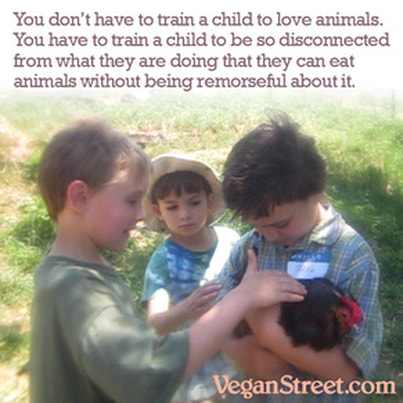
Let those words sink in for a moment. They, "Made peace with killing."
|
|
|
(Updated from it's original posting in 2017)  Back when I tabled at the Kaw Valley Seed Fair, where I gave away hundreds of free vegan food samples and literature. one of my most memorable encounters was with a couple of young women just barely out of their teens. These women, one of whom indicated she had been vegan at one point, told me with earnest conviction that as a result of interning on a small local farm, they now ate animals and no longer found it uncomfortable because they had, “Made peace” with killing them. Let those words sink in for a moment. They, "Made peace with killing."
0 Comments
My mother always said things happened so incrementally that people just accepted them – never dreaming how bad they might get...until it was too late. But her answer never explained HOW people failed to speak out against things that were so wrong in hindsight. It wasn’t until 2020 that I came to understand what I never before could – which I will explain in just a moment. Most of us upon learning of atrocities like The Trail of Tears, slavery in the US South, internment of Japanese Americans, or Tuskegee, believe we would never have gone along with things that so obviously harmed others – even if those around us appeared to be okay with them. That’s why I vowed to myself, decades ago that I’d never ignore injustice happening to others. And it’s why, in direct response to the horrors I observed happening to animals while working as a pharmaceutical industry microbiologist in the 1990s, I became a vegan.
As fear of COVID became more widespread, my family felt that negative consequences of several public health measures outweighed the benefits. They also didn’t reflect our family’s values, and they were making life harder, at an already difficult time. My parents didn’t have long to live, and we wanted our remaining time together to be as close and connected and unencumbered with additional challenges as possible. Masking and isolation were not the direction we wanted to go. Furthermore, as I was the person doing all their shopping – and because the media-promoted-fear, and public health measures impacting supply chains led to shortages, I was going to multiple stores almost daily to find supplies. It was my view from the beginning that masks were counter-productive to preventing spread. I watched people touch their mask, right in the spot most likely to be contaminated and then touch products and money with the same, unsanitized hand. Because it was hard to understand people talking with a mask on, many were leaning in close to each other in order to communicate, (at a time we were being told that keeping six feet apart was even MORE important than wearing a mask!) It was obvious, too, authorities were going to extremes to discourage affordable, readily available nutritional therapies like vitamin D, vitamin C and zinc, as well as widely available inexpensive preparations like Ivermectin, and inhaled nebulized budesonide, all of which have shown great benefit among clinicians using them. (I have since learned that the current vaccines could not be deployed under Emergency Use Authorization unless no other viable treatments were available. So vaccine industry stakeholders including the NIH, CDC and Anthony Fauci had plenty of incentive to disparage the alternatives or suppress their study.) But even more chilling was observing so many of my most educated friends being scared to question what we were being told -- perhaps because they were reading Forbes or the New York Times. When I read in The New England Journal of Medicine that the greatest benefit of masking may be its ability to function as a “talisman” that could calm anxiety – I began to ask myself, “Could mask wearing essentially be serving as a sort of ritual, accustoming people to be compliant with public health directives and paving the way for them to submit to the new experimental vaccines with unknown long-term consequences?” Few of my medically trained friends seemed to be concerned that mask mandates were put in place before any published science showed masks prevented spread of respiratory viruses, even those who knew that viruses are orders of magnitude smaller than the pore size of the mask. “Well we have to do SOMETHING!” they argued. The rationale seemed to be, “It can’t hurt and it’s no big deal, so why not?” Unfortunately I learned that’s simply not true. Mask wearing does involve some not-insignificant health consequences. Then there is what is happening psychologically to an entire generation of children, forced to wear masks and fear the microbiome of others.
Then the media began disparaging anyone who questioned what was going on as Trump supporters, Q- Anon followers or terrorists putting everyone at risk. This effectively silenced the majority of my liberal friends, who understandably didn’t want to be seen as spreading conspiracy theories. While I shared that valid concern, my own deeply held values of free speech and personal sovereignty would not allow me to abide the censorship and authoritarianism they were turning a blind eye to. I was stunned. Perhaps more bewildering, friends of mine whose parents were Holocaust survivors became the most outspoken people I knew demanding the government “lock us down!” I found this especially surreal, given our shared perception of Donald Trump as a would-be demagogue. The last thing I wanted was increased authoritarianism, while a president I saw as nasty, vindictive and disdainful of the rule-of-law was running the country. But my “lock-us-down” friends didn’t seem to be concerned about that or restrictions on speech, public assembly, or religious freedom. My dismay turned to horror as I watched people sit silently as the informed consent requirement for medical procedures vanished before our eyes. My friends were okay with all of that in exchange for feeling a bit safer from the virus. Psychological literature suggests that victims of oppression/abuse may unconsciously behave in ways that contribute to harming others...could their generational trauma explain my friends’ inability to see how they might be facilitating oppression? Could this have anything to do with the fact that Israel with widespread generational trauma from the Holocaust, is leading the world in restricting personal freedoms and coercing citizens to accept an experimental medical treatment without informed consent – a direct violation of the Nuremberg Code? And so 2020 has finally allowed me to understand HOW people could have allowed the little injustices that paved the way for Hitler’s final solution, HOW law abiding Japanese Americans could be ripped from their homes and put in internment camps, HOW researchers seeking to advance science could lie to African American men who had syphilis, and intentionally deprive them of medical treatment, HOW vaccine developers could experiment on mentally disabled children, and so many other obvious injustices that good people just like us went along with again and again in history because they were scared, or because they believed they were supporting some kind of “greater good.” That’s why the scariest thing for me about 2020, was not that a novel virus could take out myself or a loved one, but rather it was seeing how incredibly susceptible we all are to the very forces that have allowed the masses to go along with past injustices that inflicted horrific suffering or death. I heard it said once, that with war we are always preparing based upon previous battles and this can blind us to the current threats – and I think there is a parallel to that when it comes to recognizing injustice. The forces that load the gun for human caused tragedy don’t necessarily have to be triggered by race or ethnicity as many past one’s were. The next human-caused tragedy could appear motivated by dramatically different aims (seducing those who would oppose injustices they recognize as linked with race/ethnicity/sexuality/disability to go along with the little injustices that pave the way) and still cause egregious suffering and loss of life. It COULD happen again. (For a printer-friendly PDF of this essay Click HERE)
Here is a cut and pasted copy of the comment I tried to post on Statnews -- on the page with the above article: This article missed a growing reason why adults are not getting vaccines -- it's CENSORSHIP on vaccine information or any science that challenges the pro-pharma narrative dominating the media. This in turn is fueling vaccine skepticism!
Articles by Helen Branswell exemplify this problem. Branswell has superb credentials, but her writing is PR for pharma thinly disguised as "health reporting."
ing I had developed a new fear -- flying. I was also not eager to be halfway across the country from my nursing toddler.
"I can't go, we're still nursing," I said matter-of-factly to my husband. "I told them that," my husband shot back. "But you would only be gone one night. They
1) No one should be forced to live near a slaughterhouse.
2) Prime would increase carbon emissions from
animal agriculture. 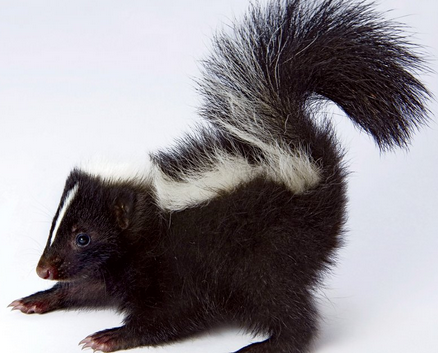 After I wrote my last post, someone emailed me a link to a professional looking website that meticulously laid out a very contrary perspective regarding Donald Watson and his motivations for helping to start the vegan movement. Though the author of that site does not disclose who they are, they went to a lot of trouble to weave together evidence obviously intended to mislead people about the fact that Donald Watson was primarily motivated by wanting to avoid exploiting animals-- while stating that Watson was really most concerned with food and diet. But then on a different page of the site, as part of the evidence they present there trying to discredit something else, they post an image of the very first vegan newsletter that Donald Watson authored. Though the image they show of the newsletter, does not allow you to read past the first few paragraphs, the actual document -- posted online and by a credible vegan organization does make the entire newsletter readable -- and here, in the fourth paragraph is the source of Watson's famous quote: "We can see quite plainly that our present civilization is built on the exploitation of animals..." Making it clear that for Watson, veganism is not just about food and health but foremost IS a moral and spiritual practice -- intended to evolve humanity away from exploitation. Here are screen shots of that entire page: l A wise former cattle-rancher (now vegan) that I very much look up to, once advised me, "Never get in a pissing match with a skunk." So for that reason I am not going to link to the nefarious revisionist website. But do be on the lookout -- who-ever did this, appears to be very motivated to undermine veganism by presenting a false narrative, and appears to have ample resources to promote it widely.
But I AM going to do my part to raise awareness of the real facts and I hope that all those who care about creating a more just world, and ending exploitation of other beings will join me and do what they can to help more people know who Donald Watson REALLY was and what he really cared about AND why the word vegan was created -- to NORMALIZE in our culture non-exploitation/non-violence. 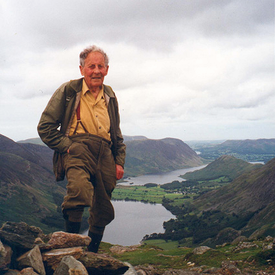 Donald Watson -- one of the first vegans Donald Watson -- one of the first vegans Do you know how the vegan movement began? For those who coined the word in 1944 and those who joined these revolutionaries long before most of the world had ever heard the word, “vegan,” veganism embodied the broad themes that universally underlie the major world religions. Fundamentally, veganism was and is about self-growth on a path that seeks justice and gives guidance as to how to live a good life. In this way, veganism connects us with something larger than ourselves. However, unlike religions and atheism, veganism does not require one to believe in a deity – nor does it preclude one from doing so. You can be deeply religious, agnostic or atheist and also be a dedicated vegan. And... 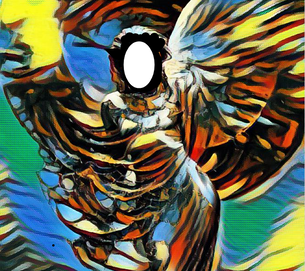 Are YOU a vegangel? The idea for this post came from my reflecting upon the many people In my life, who though not vegan themselves, have made important contributions to my work over the years. They are friends, family members and sometimes just acquaintances who on some level, appear to recognize the value of the ideas and facts vegans seek to disseminate. For the sake of this post, I am designating them, "Vegangels." But there are two also important criteria that define them: First, they do not appear to have a need to settle the cognitive dissonance of their recognition of veganism’s importance, with the fact that they are not vegan, by discrediting veganism. Second, they appear to derive some personal satisfaction from facilitating the planting of seeds that may germinate into veganism  Merry/Happy everything to all of you! In honor of the season, I have assembled a list of thought-provoking quotes from scientists, writers and social justice activists both past and present. Feel free to link to this, or post this collection elsewhere. But even better yet, print these out and share them with others. (You will need to click the, "Read more" button in order to actually read them.) 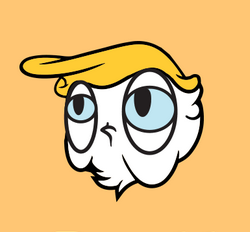 Because Donald Trump has taken a common ignored dynamic to an egregiously disturbing level, we can now give it a name: Trumpism. Naming it, makes the dynamic more visible. Naming what is problematic helps us recognize its more subtle forms in leaders or ourselves. I first saw Trumpism in my grade school, when I noticed that not all kids were popular because they were nice. Some achieved popularity via family status or money, or by being bullies (which many of us enabled by not calling them out.) We may have been scared of them and grateful we weren’t their victim. Or maybe we wanted them to include us, give us things, or help our cause. Now we have a name for the dynamic that empowers privilege while ignoring justice -- Trumpism. As I wrote about in a previous post, "Why I am not an Apologetic Vegan," humans have a long history of enabling oppressors in order to distance ourselves from those at the bottom of the pecking order. Distancing improves our status and makes us feel less likely to be a target of the oppressor (click the "read more" button to see rest of this article...) 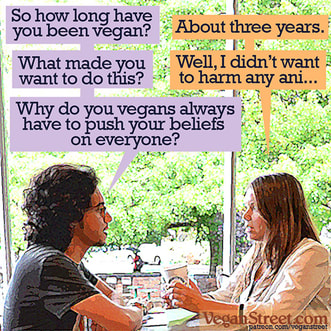 "I am not THAT kind of vegan" This is a statement that I have heard a few times recently. As veganism has become more popular, it has triggered pushback. When I began doing vegan activism in the 1990s, vegans weren’t seen as a threat to animal agriculture or to people’s coveted family or religious traditions. Grocery stores, hospitals, and local TV news welcomed me and repeatedly provided venues for me to criticize animal exploitation while encouraging people to give veganism a try. Some were inspired or motivated to change as a result of this. Those who didn’t “get” my message or disagreed, ignored me and moved on. Since vegans were so rare, this message was a curiosity not a threat. But now, almost everyone in America knows there are millions of vegans. Veganism is a viable lifestyle AND growing in popularity! Vegans are setting athletic records, running successful companies, and birthing and raising healthy vegan families. This changes everything. Conscious of it or not, those who are not yet vegan live with the continuous discomfort that they are participating in unnecessary violence against other beings. Unlike the 1990’s, now simply saying, “I am vegan” reminds non-vegans they are not living consistent with two of their own values which are also widely held. Most of us agree: It is wrong to unnecessarily harm animals. Most of us also agree: It is wrong to unnecessarily hurt your neighbors or your children and grandchildren. (Animal agriculture is a leading driver of every category of environmental destruction -- most especially climate change!) Just BEING vegan around some people feels to them, like they are being attacked because it's reminding them of their complicity. But those who DO embrace veganism, struggle with a different discord – feeling like an outcast from their tribe, family, or social group. Any choice that sets us apart from our group, can expose us to “change back.” Pressure. In order to help you understand why, saying, "I am not that kind of vegan" is problematic, I will share with you what happened to me as a child. [The 2nd vegan BBQ will be June 16, 2019 -- details HERE.] 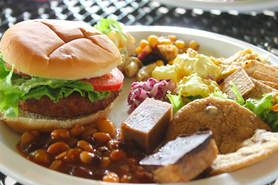 There was an amazing turn-out for the first vegan BBQ in Lawrence, Ks -- which coincidentally was 25 years to the month after the first vegan BBQ in Kansas City! Although many people came and went over the course of the several hours of this event I counted about 100 adults there at one point -- but don't really know how many attended over-all. Below are photos of the event. (All the best ones were taken by Emma Perkins --Thanks Emma!) I originally wrote this post two years ago. I have just added a bit of video from the entertainment at last year's (2017) Summerfest --- It's a really funny musical skit featuring Miyoko Shinner (Founder of Miyoko's Kitchen) Dr. Michael Greger of NutritionFacts.org and Dr. Ted Barnett (Rochester Lifestyle Medicine). This year, (2018) The big news is that Vegetarian Summerfest will henceforth be called Vegan Summerfest. Enjoy! Highlights of the 2016 NAVS Vegetarian Summerfest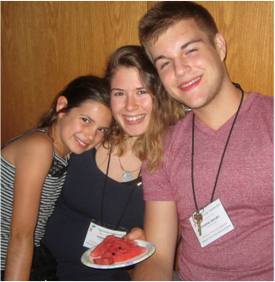 If you've never been there -- words and pictures simply fall far short of capturing the magic, the love, and the soul-affirming feeling of connection, hope and healing that is the essence of the North American Vegetarian Society's Summerfest Conference. Scroll down to see lots of pictures from this year's conference -- and notice what a vibrant looking bunch of humans are there! I've been to many other conferences -- and although they may share similar speakers, offer equivalent educational opportunities, provide tantalizing food and fun social gatherings, nothing I have yet experienced comes close to creating what the majority of the 600 plus attendees who pilgrimage to this event each year experience: Summerfest quite spectacularly and reliably renews people by immersing them 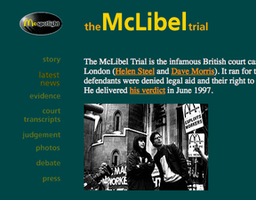 Is history about to repeat itself? Back in the 1990's a group of activists in the UK created and passed out a flyer, titled, What's Wrong With McDonalds. In response the fast food giant hired under cover agents to infiltrate the group and then served them with legal papers threatening to take them to court for libeling the McDonald's corporation. The activists didn't know it at the time, but the McDonalds company had a history of threatening it's critics with a libel suit, but then offering to drop charges, if the defendents would apologize, never criticize McDonald's again and keep confidential McDonald's threatened legal action. But this one time McDonald's bullying didn't work as planned. The activists Join me for a trip down memory lane. Here I document the birth and early years of organized vegan activism in the Kansas City area. A special thanks to all the people -- including many who contributed but don't happen to be in these pictures and clippings. Together we helped lay the foundation for the exponential growth of vegan products, vegan-friendly menu items, and vegan community that now make it attractive and easy for so many more people to make the connection and go vegan! 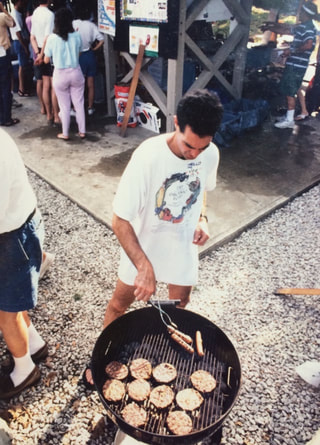 My husband Joe Farb manning one of the grills. My husband Joe Farb manning one of the grills. In 1992, I knew of exactly three vegans in the entire Kansas City area. Victoria Moran, her daughter Adair (who went by the name of Rachel, back then) and myself. Few knew to say, "Vee-gun" rather than, "Vey-gun" let alone what the word, "vegan" meant. So in 1993 a small group of vegetarian's started what I believe was the first vegetarian society in Kansas or the greater KC area -- and we called it Vegetarians of Kansas City. At first all we did was have monthly potlucks in Siobhan Defeo's home. Siobhan and a friend of hers had gotten the ball rolling by putting up notices on bulletin boards at Clearly Nature's Own at 43rd and Main, seeking to find other vegetarians. Soon after, there were 10 to 20 of us regularly sharing monthly meals and dis- 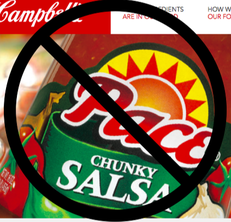 Earlier this evening, my husband and I sat down to a common dinner that we love -- home made black bean burritos topped off with Pace Salsa. For the past ten years, my family's consumption of Pace Salsa surely made us one of Campbell's better customers. Not just because of how much we eat, but because of all the demos I do, and food I make for others. I would purchase salsa in the largest size glass containers sold, sometimes bringing home a dozen jars at a time -- just to make sure I didn't run out. But that is in the past. I won't be buying Pace products any more. What, you may be wondering could have caused a passionate salsa lover like me, always looking for the best food bargains too (Pace is often the least expensive salsa I can find) to stop eating the stuff (right in the middle of dinner) and vow to not eat it any more? Well it was this. I was
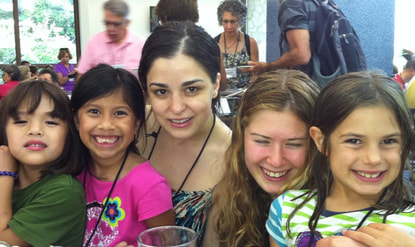 In 1942 President FDR – husband to social justice hero Eleanor Roosevelt, signed an executive order that put thousands of law-abiding Japanese American citizens in prison camps. There was little outcry. In the 1970s, in collaboration with doctors, our government forced African American men to endure late stage syphilis. Few with knowledge of this objected. U.S. history begins with violently removing indigenous inhabitants from their ancestral lands. Shockingly, in the 1800s, some abolitionists opposed women voting. Today some who support civil rights for people of color oppose marriage equality for LGBTQ identifying individuals. The book, The Immortal Life of Henrietta Lacks, describes a large American hospital in the 1950s injecting cancer cells into hundreds of patients without their knowledge or consent. Three Jewish doctors were the only ones to object. But their views were marginalized as being “overly sensitive because of the Holocaust." History is full of similar examples. Perhaps that is why Albert Einstein said, “The world is a dangerous place not because of those who do evil, but because of those who look on and do nothing.” The Holocaust is one of the most egregious examples of human’s capacity to look away and disregard injustice. After hearing about it, many wanted to know, “How did so many seemingly average people allow it to happen? The classic experiment by Stanley Milgram sought to answer this. His data showed that under certain conditions, half of us will go along with things we know harm others. Milgram stated, "Ordinary people, simply doing their jobs, and without any particular hostility on their part, can become agents in a terrible destructive process." Some cultures (and by implication their cultural practices) appear to be less vulnerable to this. So it’s worth asking, what practices might make us less likely to ignore injustice threatening someone else? 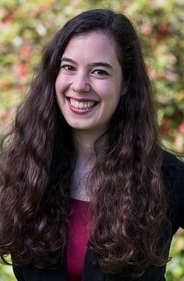 My daughter Sarina Farb wrote this guest post while still a student at Grinnell College. She has since graduated with degrees in biochemistry and policy studies and plans to begin blogging at: BornVegan.Org ------------------------------------------------------ Recently, an Italian bill proposed jail time for parents irresponsibly imposing a vegan diet on their children. It has created a lot of buzz and discussion over whether vegan parents should be allowed to “force their values” on their children. A common theme in articles and commentary I have read is that regardless of a parent’s values, they shouldn’t “force” their radical choices on their children, |
Categories
All
My Best Articles are HERE
|